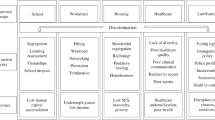Abstract
This article describes the most important determinant of contemporary American medical practice: the corporatization of the health care delivery system. It argues that there is an urgent need for greater reflection by physicians on the values inherent in profit-based health care and on the implications of such a model of care. Other pressures on the medical profession and several available responses are examined. The article then poses a challenge to the profession to assume a more forthright advocacy for social equity in health care provision.
Similar content being viewed by others
References
D. A. Whiteis, and J. W. Salmon, “The Proprietization of Health Care and the Underdevelopment of the Public Sector,” International Journal of Health Services 16:4 (1986), forthcoming.
J. W. Salmon, “Profit and Health Care: Trends in Corporatization and Proprietization,” International Journal of Health Services 15:3 (1985), 395–418.
A. S. Relman, “The New-Medical Industrial Complex,” The New England Journal of Medicine 303: 17 (October 23, 1980), 963–970.
A. S. Relman, “Meeting Community Needs is a Major Concern Raised by For-profit Health Care,” Business and Health 2 (January/February 1985), 60.
H. S. Berliner, and R. K. Burlage, “Proprietary Hospital Chains and Academic Medical Centers,” International Journal of Health Services 16: 4 (1986), forthcoming.
A. Sager, “The Reconfiguration of Urban Hospital Care: 1937–1980,” ed. A. L. Greer and S. Greer, Cities and Sickness: Health Care in Urban America (Beverly Hills: Sage Publications, 1983), 55–98.
D. Ozar, “Justice and a Universal Right to Basic Health Care,” Social Science and Medicine 15 (1981), 135–141.
J. Bingham Hall, “Medical Turmoil: Four Hospital Chains Facing Lower Profits, Adopt, New Strategies,” Wall Street Journal (October 10, 1985), 1.
R. Stevens, “The Future of the Medical Profession,” From Physician Shortage to Patient Shortage: The Uncertain Future of Medical Practice (February 27–29, 1986), Second Cornell Conference on Health Policy, Cornell University, Medical College, New York.
H. S. Berliner, and J. W. Salmon, “The Holistic Alternative to Scientific Medicine: History and Analysis,” International Journal of Health Services 10: 1 (1980), 133–148.
S. Wohl, The Medical Industrial Complex (New York: Harmony Books, 1984).
C. Derber, “Capitalism and the Medical Division of Labor: The Changing Situation of Physicians,” ed. J. McKinlay Issues in the Political Economy of Health Care (New York: Methuen, 1984): 217–256.
“Physician Heal Thyself ... Or Else,” Forbes (October 1977), 90–96.
J. W. Salmon, Corporate Attempts to Reorganize the American Health Care Delivery System, Unpublished Doctoral Dissertation, (Ithaca: Cornell University, 1978).
L. Bergthold, Business and the Politics of Health Care Policy, Unpublished Doctoral Dissertation (University of California at Santa Cruz, 1985).
M. Korcok, “From Patient Advocate to ‘Gatekeeper’: Symposium Examines Pressures, Conflicting Interests,” American Medical News (April 4, 1986), 21–23.
J. B. McKinlay, and J. Arches, “Toward the Proletarianization of Physicians,” International Journal of Health Services 15: 2 (1985), 161–195.
S. V. Williams, J. M. Eisenberg, L. A. Pascale, and D. S. Kitz, “Physicians' Perceptions About Unnecessary Diagnostic Testing,” Inquiry 19 (1982), 363–370.
R. Rosenblatt, and I. S. Moscovice, “The Physician as Gatekeeper: Determinants of Physicians' Hospitalization Rates,” Medical Care 22 (1984), 150–159.
S. A. Shroeder, “Variations in Physician Practice Patterns: A Review of the Medical Cost Implications,” ed. E. Carels, D. Neuhauser, and W. Stason, The Physician and Cost Control (Cambridge: Oelgeschlager, Gunn and Hain, 1980), 45.
C. Cancila, “Economist Deplores Selfishness of 1980's,” American Medical News (May 16, 1986), 3; 38.
M. O'Neil Mundinger, “Health Service Funding Cuts and the Declining Health of the Poor,” The New England Journal of Medicine 313: 1 (July 4, 1985), 44–47.
D. Ozar, “Patients' Autonomy: Three Models of the Professional-lay Relationship in Medicine,” Theoretical Medicine 5 (1984), 61–68.
Author information
Authors and Affiliations
Rights and permissions
About this article
Cite this article
Salmon, J.W. The medical profession and the corporatization of the health sector. Theor Med Bioeth 8, 19–29 (1987). https://doi.org/10.1007/BF00539763
Issue Date:
DOI: https://doi.org/10.1007/BF00539763




